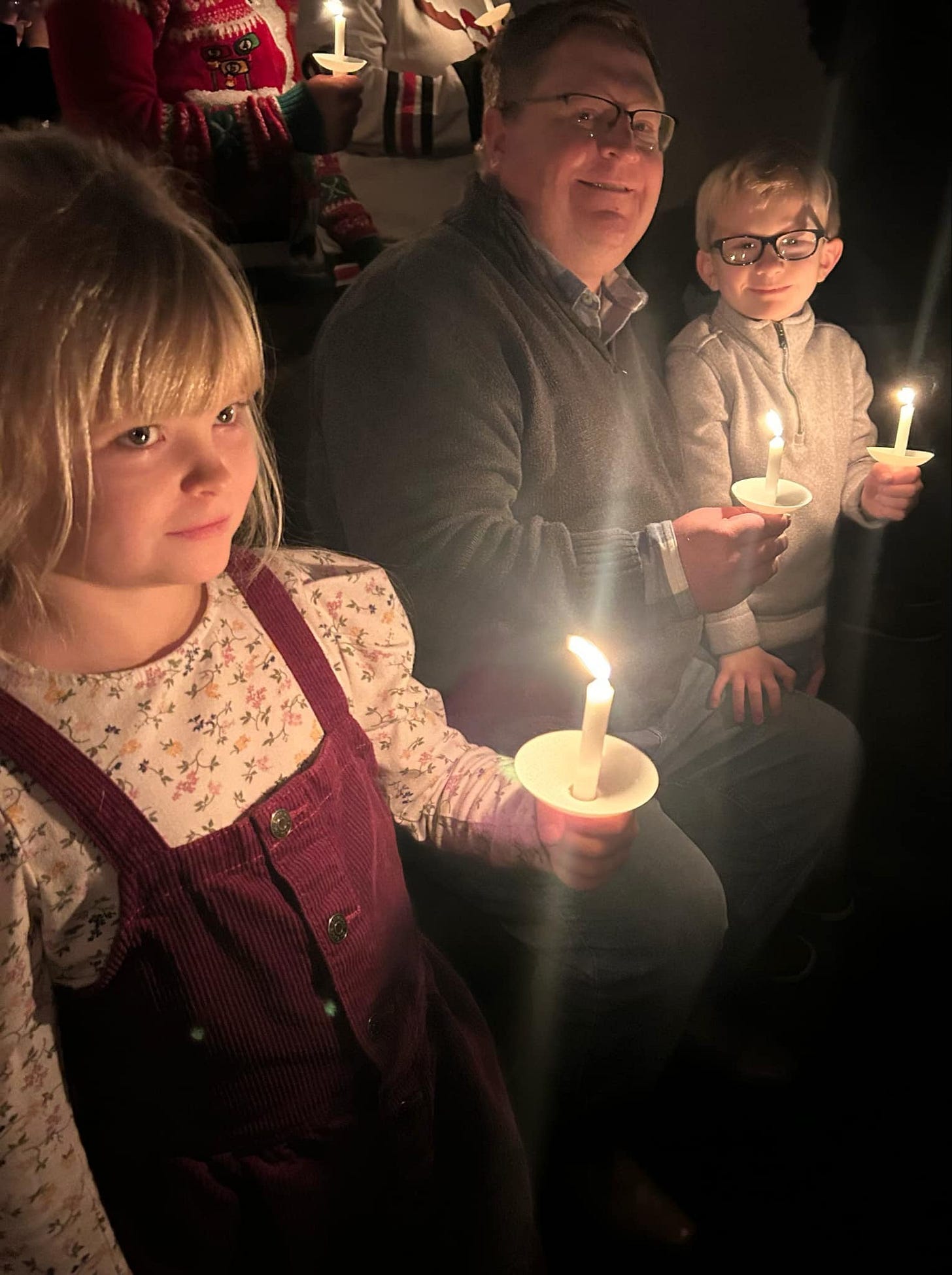The real faces of “government waste”
Beyond a wave of new rhetoric that will take center stage at President Trump’s Address tonight, millions of families are worried about changes. Here’s one of their stories.
Years ago, she could not have imagined the post she would write.
Heidi Roach was not a political person. She loves music and was a middle school music teacher. She’s a mom of three, living in a suburb of Indianapolis and wouldn't have imagined chiming in on legislation, but it’s become very personal.
A budget resolution passed by the House of Representatives last week sets up a framework that extends about $4.5 trillion dollars in tax cuts, and directs the government to cut $2 trillion dollars from federal spending — including approximately $880 billion from Medicaid and Americans’ healthcare programs.
That’s what led Heidi to post. Given the cuts outlined, the framework would likely lead her family to lose healthcare coverage. She wanted her friends and family to know that she is the face of what some call government waste, or as she put it, what some of her neighbors might consider “parasites.”
I found Heidi’s story because we grew up together; I’ve known her for more than 30 years. But you don’t need to look too far, these days, to find many stories like Heidi’s: A whirlwind of aggressive, swift cuts from DOGE, a new tone set by President Donald Trump, and Congressional action following a similar tact, have left millions of Americans worried about the consequences.
Cuts that President Trump claims will help bring about America’s new Golden Age will almost certainly take center stage tonight as the President delivers his first Address to a Joint Session of Congress. He is expected to continue to chart his policy vision — which, so far, has been an unremitting series of changes.
Heidi Asks for Help
Heidi didn’t start by taking her issues to Facebook. She tried to call her Representatives and her Senators. She got voicemail boxes, some of them full, and when she finally got a human on the phone — a woman from Rep. Jim Baird’s office — she pleaded her case for Medicaid coverage that has become essential for her family.
She received an email form response about Medicare from Congressman Baird’s office. He pledged to balance the interests of those at or near retirement and future generations. Adding: “According to the Medicare Board of Trustees, the Hospital Insurance trust fund that guarantees Medicare Part A will become insolvent by 2026… and … will require difficult fiscal decisions in coming years.”
Heidi and her family aren’t even on Medicare, the widely popular program designed for Seniors’ medical coverage. Her family of five is supported by Medicaid, including her daughter who needs asthma medication, because like so many Americans, the cost of healthcare after a job loss nearly cost her family everything.
Last week, days after she received the form letter from Congressman Baird that suggested “difficult fiscal decisions,” he joined a slight majority of his House colleagues to vote in favor of extending the $4.5 trillion dollars in tax cuts, while directing cuts to programs that have become the lifeline for Heidi and her family.
Heidi’s Story
Heidi met her husband, a fellow music lover, when she was working after college. They lived together in Bloomington-Normal, a town about an hour and a half away from Galesburg.
She taught middle school music, often helping in the elementary schools. She and her husband welcomed their first child, and celebrated the birth online. In 2017, she had her second child and kept teaching — she had had health insurance through her teaching job and managed to get her kids into daycare, a heavy expense, but one that was worth her continuing to teach.
Then her husband was offered a more lucrative transfer to Indiana. For the first time it would allow Heidi to care for her kids full time. It was with that offer that they had the confidence to sell their home in Bloomington, pack up their two children, and move for a new adventure in Indianapolis.
For the first few months, things were good. Heidi paid for COBRA for health insurance because she knew she needed consistency for the kids, and the health coverage was better than what she could get through her husband. They found a rental in Indianapolis, she helped the kids settle in and her husband went to work.
But six months into the move, the company’s fortunes changed. The position that her husband had been offered disappeared, and they were given two options: Moving back to Bloomington to her husband’s old job, with his old salary, but moving expenses and breaking the new lease wouldn’t be covered. Or stay in Indianapolis without a job. That was on a Friday. On Sunday, Heidi found out she was pregnant.
“Our daughter was one, and our son was three and a half, and I was pregnant,” she recalled when we spoke last week. They decided to stay.
Piecing it Together
Vice President JD Vance and President Donald Trump talk about the importance of caring for a family, of entrepreneurship. Something politicians of all stripes often glamorize.
This is what that looked like for Heidi and her family: Her husband was a hard worker, and would make it work. He would go to work doing multiple jobs, and on the weekend sell vinyl records at vintage markets and try to get a business off the ground. In his off hours he would drive Uber.
Heidi would try to line up appointments for her kids’ medical care, for her new pregnancy, and prepare to welcome life into the world. Anxiety was mounting, as were bills. But her husband was doing everything he could to try to make it all balance out, his sole priority was his family.
But even as they pieced it together, they fell deeper in the hole. Not long before Heidi was due, her family couldn’t afford the expensive COBRA payments, and rent, and groceries — all it took to just live. Their credit cards were piling up.
Heidi explored healthcare options, and learned her family now qualified for expanded Medicaid coverage, something former Gov. Mike Pence worked with the Obama administration after the passage of the Affordable Care Act to ensure. She quickly signed up.
Unfortunately, she found that Medicaid was much more limited than her private health insurance. Her OB-GYN had to jump through hoops to continue to provide service. The pediatrician options weren’t the same. She had to drive further for what was often perfunctory care.
Heidi worried for her kids, especially for her daughter’s asthma. So about six months after her youngest was born, and as soon as they felt financially they could try, she found a private health insurance plan that she thought would cover them, at $700 a month.
If the story stopped there, it would be one of medical debt. Costs of the coverage and the limited percentage of actual financial coverage added up quickly. So quickly they eventually found themselves back in debt and on Medicaid by 2023. By 2023 in the aftermath of the pandemic, Medicaid coverage had changed and she was so grateful to be able to see the Doctors of her choice for her kids. It was like a lifeline.
Heidi and her husband both work, now she’s working part time at the Christian preschool her youngest attended. But they are some of the millions of Americans who work and still struggle to meet basic needs, and hence qualify for subsidized healthcare.
An Act of Desperation
Heidi desperately typed out her post, asking her husband if it was ok that she shared their story: “This is the picture of a family that relies on Medicaid to provide health insurance for our children. We are those ‘poor’ people, those ‘parasites’ to our country,” Heidi wrote on Facebook.
She went on to detail her situation: The cost of her family’s private insurance, the debts it created, the huge relief of qualifying for Medicaid via the expansion program. And the shame she felt for this post, and how utterly helpless she had felt with the situation.
She pleaded with her Facebook friends to see the face of the cuts, and to call and ask their Representatives to vote against these cuts.
Heidi lives in a county where 60% of voters cast ballots for President Trump, and privately messaged with some others, some who supported President Trump, who also had family members reliant on Medicaid. Some who commented on the post didn’t believe the changes of the Republican Congress or the Republican State House would affect her, because she and her husband work.
In Indiana, the State legislature is continuing to debate cuts to the program that Heidi’s family relies on, and is adding a work requirement, but the Senate also passed a bill proposing a cap on the number of people eligible for the state’s Medicaid program. The program currently covers approximately 750,000 Hoosiers; the cap will limit the program to 500,000. The gap can’t be made up by work requirements alone.
Tax cuts proposed at the federal level won’t make the difference for Heidi’s family. Largely tax cuts are extended from what they were before, and while there are new deductions proposed — a deduction for car loan interest, tax cuts on tips and overtime — the difference isn’t nearly the $10,000 a year it would likely cost Heidi’s family to go back on private insurance. And while some promise new jobs that pay higher wages, as a benefit of tax cuts, she and her community haven’t seen them, regardless of the occupant of the White House.
It’s these kinds of cuts, cuts to programs helping Americans, that have seen residents of states show up at local town hall meetings, debating what our country’s priorities should be moving forward. Heidi is just one voice in a rising chorus of people. Last week House Speaker Mike Johnson claimed that people were paid to show up at these town hall meetings. Heidi isn’t getting a dime for her activism.
Heidi laughs at Elon Musk’s directive that we should all be having more children. He himself acknowledged another child born out of wedlock just last week.
“Never mind you, we can’t afford them,” Heidi says.
She knows her community wants to help. It was the Christian preschool that gave her a job. But even if the state wanted to, could they make up for the massive loss the state will soon face if this budget — and the new vision for President Trump’s Golden Age that he’ll preview tonight — becomes reality?
I talked with her about my frustration with some Democrats, including strategist James Carville, who said Democrats just need to let Republicans do what they will and let Americans experience the results. (There’s kind of a forced hand to this, given Democrats don’t actually have any control right now). I just worry there is going to be so much hurt for people. Heidi knows this all too personally will likely be her.
“I almost think more things that affect people are going to have to happen first,” Heidi says, because so many just don’t think they are the face of "government waste,” until something they’ve relied on is on the chopping block.
***
Note to readers: This Friday I’ll be moderating a panel at SXSW in Austin, Texas about communications in this divided time. If you happen to be in Austin for the conference, please drop me a line.






